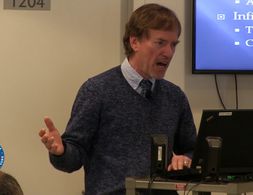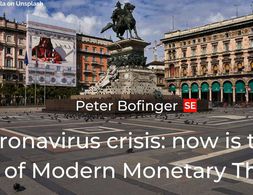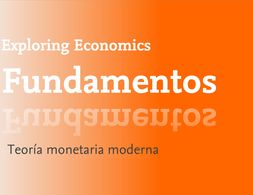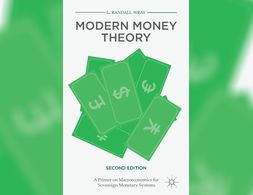✕
16 results
Based on Modern Money Theory (MMT), Stephanie Kelton compares the cryptocurrency to the fiat money system (or simply what we have today).
As tax day approached, St. Francis College Economics Professors launched their first Economics Week with three days of guest speakers and student research. Randall Wray explains some basic principles of Modern Monetary Theory.
This Blog Post describes the U.S. federal reserve money system from the perspective of the Modern Monetary Theory (MMT). Therefore it presents a theory of money creation, gives simple examples how this influences the economy and the historical process of why the monetary system of the US has developed this way.
Modern Monetary Theory (MMT) is a school of monetary and macroeconomic thought that focuses on the analysis of the monetary and credit system, and in particular on the question of credit creation by the state.
Peter Bofinger argues that the Modern Monetary Theory gives theoretical justification for bold answers to the corona crisis.
John Christensen from the Tax Justice Network addresses the Modern Monetary Theory idea that governments don't need tax revenues if they want to spend money. Doing so, he sums up the main points made by MMT proponents and their critics, and shows how MMT can be reconciled with another progressive economic narrative: "Modern Tax Theory". While MMT made valuable contributions to the policy debate on fiscal policy, it misrepresents the importance of taxation as a political matter and as a way to generate public revenues. This is where MMT steps in.
The general idea of a Job Guarantee (JG) is that the government offers employment to everybody ready, willing and able to work for a living wage in the last instance as an Employer of Last Resort. The concept tackles societal needs that are not satisfied by market forces and the systemic characteristic of unemployment in capitalist societies. Being a central part of the Modern Monetary Theory (MMT), attention for the JG concept rose in recent years.
This paper investigates how the concept of public purpose is used in Modern Monetary Theory (MMT). As a common denominator among political scientists, the idea of public purpose is that economic actions should aim at benefiting the majority of the society. However, the concept is to be considered as an ideal of a vague nature, which is highly dependent on societal context and, hence, subject to change over time. MMT stresses that government spending plans should be designed to pursue a certain socio-economic mandate and not to meet any particular financial outcome. The concept of public purpose is heavily used in this theoretical body of thought and often referred to in the context of policy proposals as the ideas of universal job guarantee and banking reform proposals show. MMT scholars use the concept as a pragmatic benchmark against which policies can be assessed. With regards to the definition of public propose, MMT scholars agree that it is dependent on the social-cultural context. Nevertheless, MMT scholars view universal access to material means of survival as universally applicable and in that sense as the lowest possible common denominator.
A pithy, stimulating debate between three great economists on the heterogeneous character of economic thought
After completing the module, participants should have gained a basic understanding of the economic school of thought referred to as "Modern Monetary Theory" and should be able to analyze the monetary processes at play in the economy and evaluate fiscal and monetary policy decisions from an MMT-perspective.
La teoría monetaria moderna (TMM) es una escuela de pensamiento macroeconómico y monetario centrada en el análisis del sistema monetario y crediticio y, en particular, en la cuestión de la creación de crédito por parte del Estado. Bebe de la tradición poskeynesiana y del chartalismo, que fue elaborada por Georg Friedrich Knapp (Ehnts 2020). La TMM cuestiona tres falsas creencias elementales respecto a la teoría monetaria que surgieron en el periodo neoclásico, y puede así entenderse como una alternativa a la concepción neoclásica del dinero.
This book provides a new methodological approach to money and macroeconomics. Realizing that the abstract equilibrium models lacked descriptions of fundamental issues of a modern monetary economy, the focus of this book lies on the (stylized) balance sheets of the main actors. Money, after all, is born on the balance sheets of the central bank or commercial bank.
Modern Monetary Theory and Practice: An Introductory Text is an introductory textbook for university-level macroeconomics students. It is based on the principles of Modern Monetary Theory (MMT).
In a challenge to conventional views on modern monetary and fiscal policy, this book presents a coherent analysis of how money is created, how it functions in global exchange rate regimes, and how the mystification of the nature of money has constrained governments, and prevented states from acting in the public interest.
This course is an introduction to macroeconomics with a specific focus on the euro area. The theoretical part provides a critical presentation of the two key macroeconomic models: the (neo)classical approach and the Keynesian approach. This allows a comparative analysis of important macroeconomic topics:
- unemployment
- inflation
- government debt and Modern Monetary Theory
- banks and financial crises.
The policy-oriented part discusses the monetary policy of the ECB and the specific challenges for fiscal policy in the euro area. The course also presents other euro area specific topics: Optimum currency area, euro crises, Next Generation EU and Green New Deal.
Jo Michell discusses some key implications of climate change regarding the standard policy prescriptions of Post-Keynesian economics, particularly relating to the possible necessity of consumption constraints and the presence of recurrent inflation.
Necesitamos cookies. Pincha en “Aceptar” para ayudarnos a hacer de Exploring Economics una mejor plataforma.
















